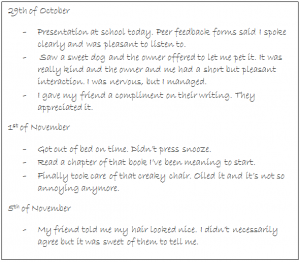5 Psychology Exercises to Understand Your Anxiety Better

That anxiety is very unpleasant is not new. But we recently got some request for practical psychology, some anxiety exercises, for example. Weve written this article to help you get a better sense of where your anxiety comes from, which might also help you in dealing with it on a daily basis. Anxiety can feel like a whirlwind of fear and worry, and these anxiety exercises are aimed at hopefully helping to create some order in the chaos.
What might an added bonus for these anxiety exercises is that you can show them to others. If you are okay with that, of course. It could help you convey your feelings if you find these things hard to explain. You can also take them with you when or if you get professional help, as a support system to explain how you are feeling.
Trigger warnings: anxiety, PTSD (there are some broad/general questions for you to rate on how triggering certain situation could be for you, do not refer to specific trauma), eating disorders (possibly, there are some food related questions). Sources can be found at the end of the article.
Disclaimer: These anxiety exercises will not replace professional help, psych2go and its related pages are not to be held responsible for any direct or indirect consequences of the following texts or any information mentioned therein. We are not professional psychologists. You read and interact with our publications and their content at your own risk.
1) Anxiety exercises: Keep a fear and worry diary.
This anxiety exercise helps you get a sense of which situations are particularly triggering for you. You keep both an activity diary – short notes on what you have been doing or going to be doing during the day. On the other hand you keep track of your anxiety levels throughout the day. For this you can use apps like SAMApp or Pacifica. At the end of a period you set for yourself – lets say 2 weeks – you lay them side to side and check what days or moments of anxiety coincide with other things in your life.
 This app will also convert your data into a graph.
This app will also convert your data into a graph.
2) Anxiety exercises: rate these situations
In the following anxiety exercises you will be rating some of the things that relate to anxiety. This one will concern situations that will give rise to (some) anxiety in some individuals, others dont. There are no right or wrong answers, just fill the list out as is most appropriate for you. Do this before you read the explanation of the exercises at the bottom of the article.

Rate the following statements on a scale from 0 – 100 about how much anxiety you experience from that situation, with 0 being no anxiety and 100 being almost unbearable to the point of uncontrolled panic. If youve never experienced something try to imagine it.
Ordering in a restaurant
Seeing a spider
Talking to someone I know well
Looking into a mirror
Giving a presentation at school in front of a class
Petting a horse
Giving an answer you are sure about in class when asked by your teacher
Looking in a mirror
Talking to someone you do not know well at school/work
Giving an answer you feel confident about in class spontaneously
Asking a store clerk to look in the back
Taking a picture with friends
Giving an answer you are not sure about in class when asked by your teacher
Asking for directions
Eating in company
Going to a party with 10 guests
Giving an answer you are not quite sure about in class when asked by your teacher
Speaking to your parent(s)/guardian(s)
Eating
Taking care of official things (passports, IDs, enrollment, money, insurance)
Getting rid of a spider or insect in your home
Having a coffee at a bar with someone you know well
Writing a cover letter/motivation for a job
Hearing someone chew food
Being close to a snake
Using public transport
Stumbling where people can see you
A job interview
Bumping into a stranger
Having someone read a piece of your writing
Asking someone out on a date
Having to go to a different location than planned on a short notice
Making an appointment with the dentist/doctor
Have you ever experienced something that could be considered traumatic or traumatizing? Then also rate the following ones (while keeping that specific situation in mind):
Thinking back to the moment(s) it happened
Encountering something that reminds you of it in public
Talking to someone about that incident out of your own will
Being reminded of it by someone or something while in a private situation
Being asked about the situation by someone
3) Anxiety exercises: physical
Anxiety, though not necessarily always, is often paired with physical sensations. Rate the following physical (and some a bit psychological) sensations on how often you experience them, and how much impairment you experience from them when/if you do. Its similar to exercise 2, just rate them from 0-100 with 0 being never experiencing any hindrance from this and 100 experiencing a lot of hindrance from this. Also, if you are worried about your physical sensations, try and seek medical advice.
rapid heartbeat
trembling
exhaustion
sweating
unnecessary muscle tension
nausea
lack of appetite
dizziness
being easily tired
upset intestines
restless or on edge
irritable
chest pain
feeling hungry
sensations of a constricted throat
headaches
tense
difficulty falling asleep
weakness in your limbs
dry throat
upset stomach
heart palpitations
4) Anxiety exercises: avoidance

We all avoid some things from time to time, but in cases of anxiety you might avoid some things more than others. How often do you avoid the following things on a scale from 0-100? This exercise will help find out how you handle different anxiety situations.
Public transport
Answering in class or at work when Im sure that my answer is correct
Making a phone call
Writing an email to a teacher/professor
Doing something you havent done before
Leaving home to go somewhere
Telling someone you like them (neutrally)
Picking up the phone
Going to school/college
Texting someone
Telling someone you like them (romantically)
Giving a presentation
Writing creatively and publishing it (online or on paper)
Leaving home for work
Asking store clerks for help
Trying to learn a new skill
5) Anxiety exercises: Keep a positive achievement diary
This is one also often used by psychology and cognitive behavioral therapists. Try to keep a consistent diary with things you enjoyed or did well, especially adding things that made you feel anxious at first. Keep it on you or easily available to give yourself a reminder when you need it most. It takes a while to turn this into a habit, but it also conditions your brain into focusing on more positive achievements too. A large problem with anxiety is that your brain is so set on panic and worry that your thoughts quickly jump to negative conclusions. Furthermore, not only will this exercise be able to give you a boost at moments when you need it, but it will also help you in the longer run.
It can be really difficult to find things to write down but set the bar as low as you dare. Ive tried it and Ive really struggled as I only wanted to put in ‘bigger achievements: passing a difficult course, making X amount of money in a week, instead of more everyday ones. The more everyday achievements are even more important for this exercise. This is an example one of my best friends gave me: I couldnt find the almonds in the supermarket and asked a clerk instead of walking around for a long time and hoping Id find them myself, or I went to a party I was dreading. I actually managed to enjoy myself a little bit.

These were 5 psychology exercises to help you understand your anxiety better. What did you think of them? Share this article if you want to see more like this. Do you know any other exercises?
Further explanations of the anxiety exercises
Anxiety exercises, exercise 2: Pick all the statements for which you scored yourself over 65. How many statements are there? If there are less than 4 see how many are left when you take scores over 55. If there are more than 10, see how many there are for 75. Keep checking until you have about 5-8 statements. Do they have one or two common themes? Some prompts were specifically aimed at social situations, some at possible specific phobias, others at achievement situations (marks at school or job interviews for example). Others investigated trauma. Which ones seem to be most triggering for you?
Anxiety exercises, exercise 3: Not everyone experiences all of them, and not everyone experiences them to the same extent. Some are easier to solve than others. Not everyone experiences the same combination of these, so we cannot give solutions for all of them. (That would be a very long article). Find the 4 you rated highest and try to find a safe and appropriate way to lessen them for example through Google or psychology related websites. Furthermore, please read our disclaimer at the top of the page. If this article is popular enough and enough people want it, you could request some tips and tricks for these things through our social media. If we get enough of those we might write a follow up article to this one with some tips and tricks.
Anxiety exercises, exercise 4: Similar to exercise 2.
Pick all the statements for which you scored yourself over 65. How many statements are there? If there are less than 4: How many are left when you take scores over 55. If there are more than 10, see how many there are for 75. Keep checking by either lowering or increasing your score until you have about 4-6 statements. Do they have one or two common themes?
credit [x]

@Jenna
Heya!
What a wonderful thread - it seems like you put a lot of time and effort into it, thank you for that.
The app looks lovely, I think I might give it a go! :3
Wishing you all the best 
